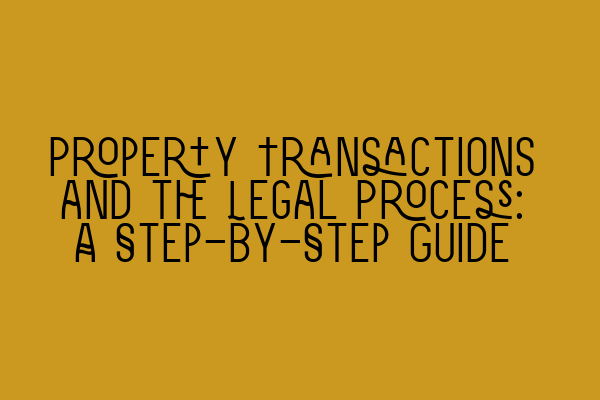Property Transactions and the Legal Process: A Step-by-Step Guide
When it comes to property transactions, navigating the legal process can be complex and overwhelming. Whether you are buying or selling a property, understanding the steps involved is crucial for a smooth and successful transaction. In this comprehensive guide, we will walk you through the key stages of a property transaction, providing you with insights and tips from our expert team at SQE Property Law & Land Law.
1. Preparing to Buy or Sell
The first step in any property transaction is preparation. If you are looking to buy a property, it is important to determine your budget and obtain mortgage approval. On the other hand, if you are selling a property, organizing and gathering all relevant documentation is essential. This includes property title deeds, planning permission documents, and any warranties for work carried out on the property.
For a more detailed guide on preparing for a property transaction, check out our SQE 1 Preparation Courses article.
2. Instructing a Solicitor
Once you are ready to proceed with the transaction, it is crucial to instruct a solicitor specializing in property law. A solicitor will act as your legal representative throughout the process, ensuring that your rights are protected and that all necessary legal requirements are met.
When choosing a solicitor, it is important to consider their expertise, experience, and reputation. At SQE Property Law & Land Law, our team of highly skilled solicitors is dedicated to providing exceptional service and achieving the best possible outcome for our clients.
For assistance in selecting a solicitor, feel free to contact our team or explore our SQE 2 Preparation Courses for further guidance.
3. Conducting Searches
As part of the legal process, your solicitor will conduct various searches to gather essential information about the property. These searches typically include:
- Local Authority Search: This search provides information on planning permissions, building control regulations, and any potential developments in the area.
- Environmental Search: This search highlights any environmental risks or hazards associated with the property, such as contamination or flood risks.
- Water and Drainage Search: This search reveals information about the property’s water supply, drainage system, and any potential obligations or restrictions.
- Chancel Repair Liability Search: This search determines whether the property is subject to chancel repair liability, which is a financial obligation to contribute to church repairs.
These searches are crucial in identifying any potential issues or risks associated with the property, allowing you to make an informed decision.
4. Reviewing the Contract
Once all necessary searches have been completed and the relevant information has been gathered, your solicitor will review the contract. This includes examining the terms and conditions of the sale, ensuring that they are fair and favorable to you.
It is crucial to thoroughly review this contract and seek legal advice if needed. Making any changes or negotiating terms may be possible during this stage to protect your interests and ensure a smooth transaction.
5. Exchanging Contracts
Exchanging contracts is a significant milestone in the property transaction process. At this stage, both the buyer and seller are legally bound to proceed with the transaction. Typically, a deposit is paid by the buyer, and a completion date is set.
While exchanging contracts represents a commitment from both parties, it is important to have contingencies in place. These contingencies, known as conditions of sale, may include obtaining mortgage approval or resolving any outstanding issues highlighted during the searches.
6. Completion and Transfer of Ownership
The completion stage is the final step in the property transaction process. On the agreed completion date, the buyer’s solicitor transfers the remaining funds to the seller’s solicitor. Once the funds have been received, the transfer of ownership is completed, and the keys to the property can be handed over to the buyer.
At this stage, it is essential to carry out a final inspection of the property to ensure it is in the agreed-upon condition. Any outstanding issues should be addressed, and a completion statement detailing all financial transactions should be provided to you by your solicitor.
Conclusion
Property transactions can be complex, but with proper guidance and expert support, you can navigate the legal process smoothly. By following this step-by-step guide and enlisting the assistance of a reputable solicitor like SQE Property Law & Land Law, you can ensure a successful and stress-free property transaction.
For more information on property law and the legal process, explore our SRA SQE Exam Dates to find relevant articles and resources.
